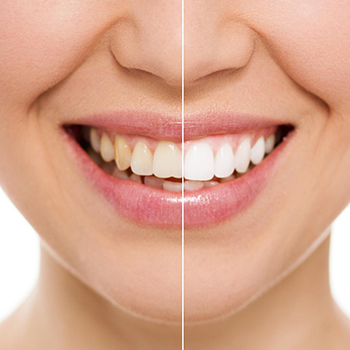Teeth Whitening treatment in Vijayawada, removes surface stains and discoloration from the teeth. The procedure involves applying a peroxide-based gel or light-activated whitening agent to the teeth, which breaks down and lifts away stains, resulting in whiter teeth. Teeth whitening can be performed at home using over-the-counter kits or in-office by a dentist, who uses higher concentrations of whitening agents and specialized equipment. The results can be immediate, with some people noticing a significant difference in their teeth color after just one session. However, whitening agents may not be effective on teeth that have undergone certain dental treatments, such as porcelain crowns or fillings, or on teeth stained due to intrinsic factors, such as fluorosis or tetracycline exposure. Regular maintenance and touch-ups may be necessary to maintain optimal results, as teeth can stain again over time.
Who is the right candidate for teeth whitening?
Teeth whitening by best dental doctors in Vijayawada is generally suitable for individuals with discolored or stained teeth due to factors such as aging, smoking, coffee or tea consumption, or other lifestyle habits. To be eligible for teeth whitening, teeth should be relatively healthy, with no major cavities, gum recession, or tooth sensitivity. Patients with the following conditions should consult their dentist before undergoing teeth whitening: tooth decay, gum disease, worn-out tooth enamel, or sensitive teeth and gums. Additionally, teeth whitening may not be suitable for individuals with dental veneers, crowns, or implants, as the whitening solution cannot penetrate through these materials. Patients with certain medications, such as those with peroxisome proliferator-activated receptor gamma (PPAR gamma) agonists, may also require caution or consultation. Pregnant or breastfeeding women should consult their dentist at Dental Clinic in Vijayawada before undergoing teeth whitening due to a lack of sufficient research on its effects during pregnancy and lactation. A thorough dental checkup before teeth whitening ensures that the procedure is safe and effective for the patient.
How is teeth whitening done ?

Teeth whitening typically involves either in-office procedures performed by a dentist or at-home treatments. In-office whitening uses a high-concentration bleaching agent, often hydrogen peroxide, applied to the teeth, sometimes with the aid of a special light or laser to accelerate the process. The dentist carefully protects the gums during the treatment. At-home options include custom-fitted trays provided by a dentist, filled with a lower-concentration bleaching gel, worn for a specific duration nightly or for a few hours during the day. Over-the-counter products, such as whitening strips and toothpastes, offer milder whitening effects. The effectiveness of the treatment can vary depending on the degree and type of staining, with results ranging from several shades lighter to a more subtle improvement. Consulting with a dentist at Giggles Dental care is important to determine the best and safest approach for achieving the desired results, as well as to rule out any underlying dental issues.
How to ensure long lasting results after teeth whitening as per Dr. Hanisha Adusumilli ?
- Avoid staining foods and drinks: Limit coffee, tea, red wine, dark sodas, berries, and heavily pigmented sauces.
- Practice good oral hygiene: Brush twice daily with a whitening toothpaste and floss daily to remove surface stains.
- Use a straw: When consuming staining beverages, use a straw to minimize contact with your teeth.
- Regular dental checkups: Schedule routine cleanings and checkups to remove plaque and address any potential issues.
- Touch-up treatments: Consider occasional touch-up whitening treatments, as recommended by your dentist, to maintain your desired shade.
- Quit smoking: Smoking stains teeth and negates whitening efforts; quitting will significantly preserve your results.
Why professional teeth whitening?
Professional teeth whitening offers several advantages. Firstly, it provides dramatically faster and more noticeable results compared to over-the-counter options, often achieving several shades whiter in a single session. Secondly, the process is supervised by a dental professional, ensuring safety and minimizing risks of gum irritation or sensitivity. Thirdly, dentists use stronger bleaching agents, resulting in more effective stain removal, including stubborn discoloration from coffee, tea, and tobacco. Fourthly, custom-fitted trays used in professional treatments provide more even whitening and better protection for the gums. Finally, professional whitening often includes post-treatment care and advice to maintain the results and address any potential sensitivity.
FAQ’s [Frequently Asked Questions]
Is teeth whitening safe ?
Yes, when done under expert supervision by dental specialists, it is safe !
Is teeth whitening a painful procedure ?
Sensitivity is possible after getting your teeth whitened but pain is usually not an after effect of teeth whitening.
Can diabetic and hypertensive patients undergo teeth whitening?
Yes, it is safe for patients with diabetes and hypertension to undergo whitening however it is always recommended to check with your specialist regarding it.
Are at home teeth whitening products useful ?
They are very superficial and might or might not give the desired results.
Will implants and artificial teeth be whitened as well ?
No, they can be cleaned but wont be whitened. However there wont be a disparity between natural teeth and whitened teeth.
Are regular dental check ups a must after teeth whitening ?
Yes, no matter the type of treatment, regular check ups are needed.
Will teeth whitening cause sensitivity in teeth ?
The sensitivity is usually temporary however it can be easily managed with right tooth pastes.